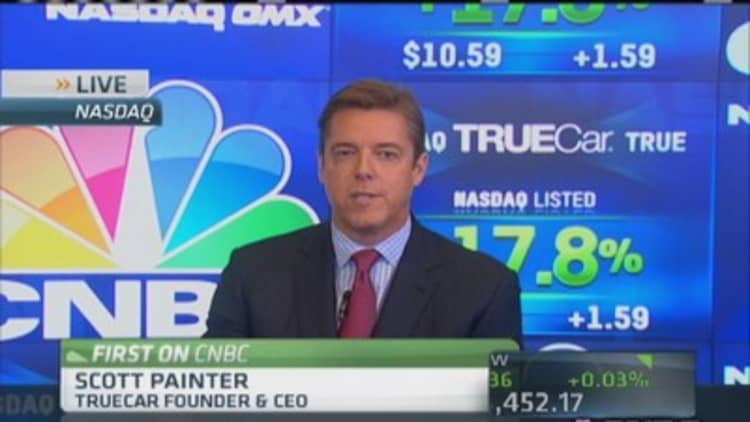If there is one purchase that consumers would like to simplify, it's buying a new car. Can a tech company crack the code?
That's the aim of TrueCar, which had its initial public offering in May. The company operates a sleek Web page where users enter details of the vehicle they want to purchase and immediately see a list of dealers with prices. TrueCar effectively eliminates the need to shop around or endure a painful haggling process with car salespeople.
Unfortunately, TrueCar appeared to be a victim of the investor rotation away from technology companies earlier this year. The stock priced well below the projected IPO range, with investors concerned that the company had yet to post meaningful profits.
But TrueCar has advantages that could soon give the stock some steam. The company charges car dealers a fixed $300 per vehicle sold through its referral service. That is a fraction of the advertising cost many dealers need to lay out to attract each customer. While most TrueCar-affiliated dealers still advertise heavily, they should soon be able to scale back as TrueCar referrals become a bigger percentage of sales.
Indeed, one large BMW dealership in New Jersey told CNBC it sells about 25 percent of its cars to customers who used TrueCar. That's up from about 10 percent just one year ago, the dealer said.
There's plenty of room for other dealers to do more business through TrueCar. Last year, TrueCar transactions accounted for less than 3 percent of all new vehicle sales in the U.S.
The company's progress is apparent in its sales growth. TrueCar's revenue rose 75 percent in the first quarter, with the vast majority of that growth coming from higher sales at existing dealerships.
Read MoreGM CEO taking 'significant actions'
The rest of the growth is due to new dealership additions, which have plenty of scope to continue. At the end of March, the company had 7,210 dealerships. At an investor presentation, the company said it can comfortably reach 11,000 to 12,000 domestic dealerships, according to a shareholder.
Overall car sales should also continue apace for some time. After the financial crisis, many consumers put off car purchases for two or three years, suggesting there is pent-up demand. Sales levels have only recently returned to precrisis levels of around 15 million new light vehicles per year, versus levels around 10 million in the crisis.
Skeptics may argue that competitors can simply replicate TrueCar's model and win dealerships by charging less. But it has taken the company several years and more than $100 million to develop technology and cultivate relationships with dealers. Local laws concerning car sales can vary drastically, making it time consuming to establish new dealer relationships.

Another concern is the impact TrueCar has on the dealers themselves. Transparent pricing has driven down prices for consumers and made it harder for dealers to make a profit. Dealers revolted against the company a couple of years ago, but TrueCar managed to win many of them back by putting limits on how aggressively they can discount vehicles. Indeed, the company's dealer count rose 23 percent from a year earlier in the first quarter.
When will TrueCar become profitable? In 2013, the company had slightly positive earnings before interest, taxes, depreciation and amortization. The main reason profits haven't been higher is that TrueCar spends very large amounts on marketing to build brand awareness. Those costs are very unlikely to keep pace with sales growth in the next couple of years, suggesting the company's EBITDA margin will rise fast.
Conservatively assuming revenue rises 50 percent this year, TrueCar trades at about 4 times 2014 sales, far less than many high-growth tech companies. With a firm grip on the car market, the stock could soon move into pole position.
Read MoreHow to save a bundle on insurance. Or not.
—By CNBC's John Jannarone.

